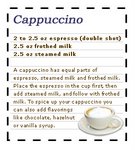Want a drug that could lower your risk of diabetes, Parkinson's disease, and colon cancer? That could lift your mood and treat headaches? That could lower your risk of cavities?
If it sounds too good to be true, think again.
Coffee, the much maligned but undoubtedly beloved beverage, just made headlines for possibly cutting the risk of the latest disease epidemic, type 2 diabetes. And the real news seems to be that the more you drink, the better.
Reducing Disease Risk
After analyzing data on 126,000 people for as long as 18 years, Harvard researchers calculate that compared with not partaking in America's favorite morning drink, downing one to three cups of caffeinated coffee daily can reduce diabetes risk by single digits. But having six cups or more each day slashed men's risk by 54% and women's by 30% over java avoiders.
Though the scientists give the customary "more research is needed" before they recommend you do overtime at Starbuck's to specifically prevent diabetes, their findings, reported just two weeks ago, are very similar to those in a less-publicized Dutch study last year. And perhaps more importantly, it's the latest of hundreds of studies suggesting that coffee may be something of a health food especially in higher amounts.
There's also some evidence that coffee may help manage asthma and even control attacks when medication is unavailable, stop a headache, boost mood, and even prevent cavities.
The Benefits of Caffeine
Is it the caffeine? The oodles of antioxidants in coffee beans, some of which become especially potent during the roasting process? Even other mysterious properties that warrant this intensive study?
Actually, yes.
Some of coffee's reported benefits are a direct result of its higher caffeine content: An eight ounce cup of drip-brewed coffee contains about 85 mg -- about three and a half times more than the same serving of tea or cola or one ounce of chocolate.
But you can get other others benefits from coffee that have nothing to do with caffeine. Coffee is loaded with antioxidants, including a group of compounds called quinines that when administered to lab rats, increases their insulin sensitivity. This increased sensitivity improves the body's response to insulin.
The bottom line: People who already drink a lot of coffee don't have to feel guilty as long as coffee does not affect their daily life. They may actually benefit from coffee habits in the long-run.
Coffee Parfait
This is a great dish to serve when you want to impress somebody. Just don't let on that it is so easy to make.
2 Tbs (30 ml) cornstarch (cornflour)
3/4 cup (180 ml) sugar
A pinch of salt
2 Tbs (30 ml) milk
2 egg yolks, beaten
2 Tablespoons PurJava Coffee
3/4 cup (180 ml) water
1 1/2 cup (375 ml) whipping cream Additional whipped cream for topping
Ground cinnamon
Combine all ingredients except for the whipping cream in a saucepan and hold over another pot of simmering water. Stir constantly until the mixture thickens and coats the back f a spoon. Chill in the refrigerator for 1 to 2 hours. Whip the cream until it is light but not stiff and fold into the coffee mixture. Serve in parfait cups or stemmed wine glasses and top with additional whipped cream and a light dusting of cinnamon. Serves 4 to 6.
As the most potent chemical component in coffee or tea, we are all very aware of caffeine. Next time you're sitting around the coffee shop, enjoying a latte and perhaps talking about coffee in general, you can appear quite learned by tossing around these caffeine facts.
Coffee Trivia
Caffeine was first isolated from coffee in 1820
In its pure state, caffeine is a crystalline white powder.
Caffeine can be found in 60 different plants.
10g of caffeine is considered a lethal dose.
It's the most popular drug in the world. Ninety percent of Americans
consume it in some form every day.
Over 450,000,000 cups of coffee are consumed in the USA every
day.
Darkly roasted coffee has less caffeine than lightly roasted.
Contrary to popular belief, caffeine (or coffee) won't help someone
sober up if they have had too much to drink.











No comments:
Post a Comment